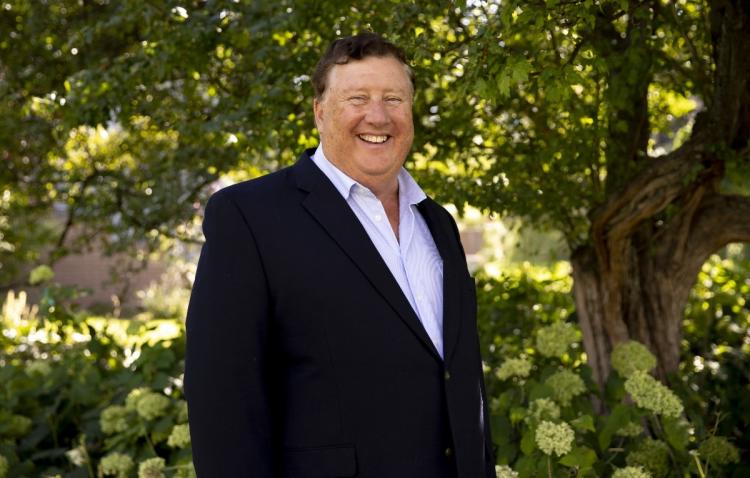Recognized as a leader in Indigenous health and well-being, Dr. Rod McCormick's work as a researcher, psychologist and BC Innovation Chair in Indigenous Health at Thompson Rivers University (TRU) has been pivotal in advocating for Indigenous approaches to mental health.

His dedicated advocacy for systemic changes in mental-health policy, including addressing the high rates of suicide among Indigenous youth, and his continued work developing programs tailored to Indigenous needs have made him an important figure in academia and Indigenous youth mentorship.
McCormick has received significant recognition and awards that reflect his contributions to academia and research, including recently being recognized for his scholarly achievements by the Royal Society of Canada. He is the first scholar at TRU to be elected as a Royal Society of Canada Fellow an honour he is receiving at a ceremony in Vancouver on November 8. Recognition by the Royal Society is the highest honour an individual can achieve in the arts and humanities, social sciences and science.
His focus on making change in Indigenous health is reflected in McCormick's latest four grants totalling almost $10 million from the Canadian Institute for Health Research (he is co-investigator or co-principal investigator on all) that delve into practices and ethical protocols in Indigenous health research, impacts of the climate crisis on youth mental health and possible solutions, and strengths and solutions in health care for Indigenous mental health and wellness.
Quite simply, he is leading the drive for change. "Indigenous youth deserve the opportunity to not only survive but thrive," he says.
Strong foundation
McCormick's desire to be part of positive and much-needed change within the Indigenous community began at a young age. Raised in Iroquois, Ont., by a Mohawk (Kanien'keha'ka) mother and Scottish father, he sought activities that built him up.
"When I was 12, I joined the army cadets. After that, I moved on to the sea cadets, then the army reserve, followed by serving as an officer in the naval reserve. Finally, I joined the coast guard search and rescue. It was a big part of my life until I was 23 or 24 years old," he says.
"Those experiences were really empowering for me, because I took mountaineering courses and was out in the bush. I really challenged myself, pushed myself, and gained a lot personally. I wasn't always successful, but I realized I just had to try. I learned to be more confident and take risks, which influenced my approach to life and later, my work."
Inspired by these experiences, McCormick pursued higher education at Carleton University in 1980 and Queen's University in 1981, earning a Bachelor of Arts and a Bachelor of Education, respectively. In 1986, he obtained a Master of Arts in Counselling Psychology from the University of Victoria, and in 1994, completed a PhD in Counselling Psychology at the University of British Columbia, where he later worked as an associate professor in the Counselling Psychology Program.
Driving change
McCormick's work has had tangible outcomes.
While employed as a high school counsellor in Whitehorse, Yukon, he created a support group for suicidal students and developed protocols for mental-health professionals. No student died by suicide during his tenure at the school.
McCormick's notable contributions to career development for Indigenous youth include creating the workbook Guiding Circles, which engages parents, friends and community members in career decision making for Indigenous students. The workbook was piloted in high schools and later marketed, with significant success, in Canada and Australia.
He believes his initial work, and articles that came from his PhD research, has probably had the greatest impact on Indigenous health.
"For my dissertation, I looked at the facilitation of healing for First Nations people of BC," he says. "I interviewed 50 Indigenous people about their healing journeys, which was kind of a novel idea in the sense I was asking the real experts, those that experienced this phenomenon, how they healed.
"I came up with a path to healing that's been widely used. And this strength-based research became something important for Indigenous people. Previous to that, so much research was what's wrong with us, our problems with depression and substance abuse. Nobody was really writing about the strengths, so most of my work after that focused on strength-based approaches, challenging the pathologizing nature of previous research in psychology."
Another of McCormick's studies looked at a group of individuals who recovered from being suicidal and the role nature played in their healing.
"In all my research, nature is an important part of people's healing. Often, individuals won't recognize or acknowledge that, but when they tell their stories about their healing, nature is a common theme," he says. "That type of research encouraged a lot of others to look at strength-based research when it comes to Indigenous people and mental health."
Empowering future leaders
At Thompson Rivers University, McCormick is the director of the All My Relations Research Centre and a leader in the Knowledge Makers Program. He plays a vital role in building a supportive community for Indigenous students, encouraging peer support and collective learning.
Launched in 2016, Knowledge Makers connects Indigenous researchers, starting at the undergraduate level. The future aim is to extend the program to other community members.
"We're expanding the Knowledge Makers program in two directions," he says. "We want to focus on the knowledge mentors Elders and also the knowledge seekers Indigenous youth from kindergarten to Grade 12 and integrate those components."
McCormick continues to draw upon his deep cultural insights, extensive experience and expertise to mentor and guide the next generation.
"I've always tried to inspire grad students, community workers, whoever I'm working with," he says.
"If I had a mantra, it's to be genuine, humble and courageous, and take risks. That's how you build trust and make a difference."













